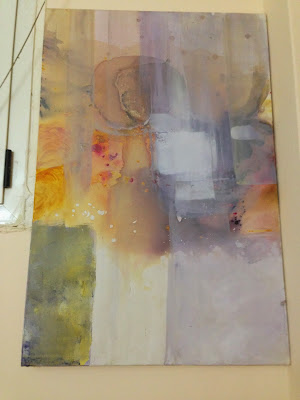The advantages are that buses are incredibly cheap maybe just one
pound for a ride. Taking two buses to Khartoum center and paying 2-4 pounds
seems well worth the effort when a negotiated amjad could easily run you 30-40 pounds.
Also buses run on all the major roads so finding them isn’t very difficult at
all. Some guide books have attempted to detail the bus routes but I don’t think
these are extremely helpful.
So how do you actually do it? How
do you use the bus system when there are no written schedules, routes, and the
stations are half parking lots with a few scattered signs in Arabic and half
literally in the street? Well it’s not for those looking for the most efficient
and timely experience, but this goes hand in hand with Sudanese culture. This
being said I still think that Americans could learn a lot from the Sudanese bus
system.
Disclaimer: This is from my very
limited and personal experience riding a handful of the same routes a dozen or
so times.
The easiest way to get a bus is at
a bus station, but you can also “catch a bus” if you know gesture correctly and
know where its going. Bus “stations” are very spread out sometimes even include
the road and side streets. The only way to find out where the bus is that you
want is to ask people. Because I don’t actually speak Arabic this normally
includes gestures repeating the place, repeating places near the place, and
sometimes having had a Sudanese friend write the place in Arabic on a note pad.
If youre in the wrong section at “the station” someone will point you in the
right direction. Often times someone will even say come with me and will ask
around for you till you find the right bus. It common for people to even go far
out of their way to help you. So that’s the big secret on how Sudanese navigate
a bus system with many routes leaving and coming at different times…they talk
to people. For someone with little Arabic this is the main challenge. Luckily,
Sudanese are generally happy and patient to help.
If you’re on a major road you can
catch a bus. You have to know the hand signal and listen for what the guys are
shouting. Once you’re on a bus the bus attendant who stands in the doorway will
snap at the front of the bus. It’s time to pay him when he snaps at you. Paying
in low bills or coins is the best but I’ve seen people pay for one person with
10s 20s and even a fifty. Often times they collect all of the money before divvying
out change. The process of paying by handing and passing money up and down the
bus is something admittedly would never work in America, but it is refreshing
that people are so trusting and honest so it works in Sudan.
There aren’t really set bus stops. To
“request a stop” you snap or hiss. People snap at you to get your attention;
its not rude. Even my students snap at me in class. A lot of time for men the
bus won’t even come to a complete stop and the guy has to jump out.
Riding the bus has been a mix of
good and frustrating experiences for me. To independently get between places
without relying on a taxi feels good but sometimes it’s just not realistic. Sometimes
buses just don’t go where they say or go over a different bridge than you
thought. Sometimes there is no good way by bus to get somewhere. I’ve tried to
adapt the Sudanese attitude when it comes to these otherwise problems…its
really Ma Mushkila I know I’ll get where I need to go eventually. I know that
sometimes I have to let it go and hop in a rickshaw or amjad. I remind myself “hey
youre in a foreign city” Its ok. But I do still laugh when I think about when I
told a man I wanted to go to “Khartoum Itneen” (Khartoum 2) and he told me he didn’t
speak English I just stared at him. “Khartoum Itneen,” I repeated.
*Note for concerned family I
frequently take the bus with Rachel or a group of friends and we almost never
ride after 8pm really because they stop running as frequently
















